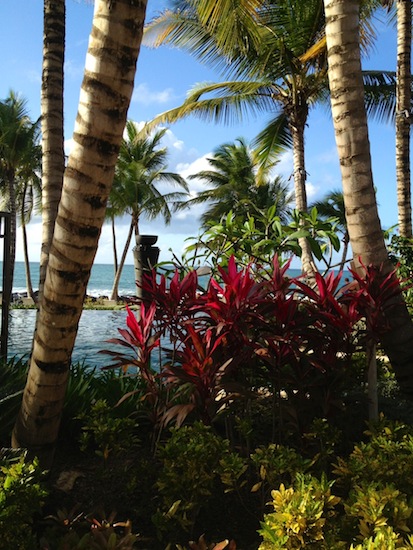LETTERS FROM THE GLOBAL PROVINCE
The Quick Sands of Puerto Rico, Global Province Letter, 5 March 2014
And I come tumbling down, I come tumbling down
I come tumbling, tumbling down
Like a house of cards
-- Amanda Stott “House of Cards”
 Fawlty Towers. There are only 12 episodes. Written by John Cleese and his onetime wife Connie Booth, Fawlty Towers is set in Torquay in the south of England where husband and wife hilariously mismanage a small hotel patronized by zany customers who are served by a staff which knows how to burn the food and how to bungle almost any request from a guest. The very funny Cleese (both he and Ms. Booth play the leads) is a frightful bore on the videotapes when he opines about the series, proving all too well that there is nothing so boring as a comedian who wants to be taken seriously.
Fawlty Towers. There are only 12 episodes. Written by John Cleese and his onetime wife Connie Booth, Fawlty Towers is set in Torquay in the south of England where husband and wife hilariously mismanage a small hotel patronized by zany customers who are served by a staff which knows how to burn the food and how to bungle almost any request from a guest. The very funny Cleese (both he and Ms. Booth play the leads) is a frightful bore on the videotapes when he opines about the series, proving all too well that there is nothing so boring as a comedian who wants to be taken seriously.
Oddly enough the inspiration for the series was a real hotel in Torquay named Gleneagles. Fact is, most of the top hotels we have stayed in over the last 2 years could serve as inspiration for more episodes since they all seem to be held together by baling wire. In Boston we recently lost our water for ¾ of a day at one hostelry. In Bangkok the electricity disappeared for the better part of a day at the famed, wonderful Mandarin Oriental. For a many hours one New York high end hotel could simply do nothing but nothing right until we contacted its senior management in another country in order to prod local management. Luxury has become a faint memory, something that used to be. The better hotels are much like first class accommodations on present-day American Airlines, which are no better than the coach seating of old. Here is an episode of this hilarious series.
Ritz Carlton Dorado Beach. Fawlty Towers very much came to mind during our recent stay at Ritz Reserve Dorado (its first ultra-property in the United States). Surely this is one of the most beautiful hotels in all the United States, and in all the world. Yet its ‘luxury experiences’ included a desperately stringy, fatty skirt steak from room service our first night, difficulty reaching any manager and, often enough, reaching anybody on the phones, a Samsung TV packed with oddball functions (one was suppose to look at menus on the tube, paper being a rare commodity) and a poor selection of hard to dial TV stations, out of stock beverages on its liquor list, half-baked restaurant service on two nights, no newspapers except on one day, a squishy mattress, etc., etc., etc. The Ritz has long since departed from the Carlton: the chain is now owned by Marriott which simply does not have the skills or temperament to do high end hotels, although it offers real value in the mid- price and cheap- end tiers.
 But of course we have not told the sweet part of the story. Despite the dross, the Dorado Beach Property is wonderful and well worth staying at if you can afford the tariff. Marriott is charging ultra-high luxury prices for a middling hotel. But underneath it all lie some wonderful comforts. To wit, one strolls about a beachfront that is mind-clearing (where no construction would not be allowed under current conservation zoning codes) and a tree lined property that is transcendent. The owners of the property (Ritz is only the operator) have put in $9 million worth of plantings adjacent to the hotel that include, for instance, some 40 varieties of palm. We apparently are the only guests who have ever asked for a tour of the gardens, which are something not to be missed.
But of course we have not told the sweet part of the story. Despite the dross, the Dorado Beach Property is wonderful and well worth staying at if you can afford the tariff. Marriott is charging ultra-high luxury prices for a middling hotel. But underneath it all lie some wonderful comforts. To wit, one strolls about a beachfront that is mind-clearing (where no construction would not be allowed under current conservation zoning codes) and a tree lined property that is transcendent. The owners of the property (Ritz is only the operator) have put in $9 million worth of plantings adjacent to the hotel that include, for instance, some 40 varieties of palm. We apparently are the only guests who have ever asked for a tour of the gardens, which are something not to be missed.
One of the chefs has made marmalades to accompany breakfast that shunt aside the dreadful jams hotels usually offer. Jose Andres, the creator of the main restaurant Mi Casa, has lined the menu with some tapas that are truly outstanding such as a delectable sweetbread (Mallorca con higado de pato y mango) and tortilla de patatas ‘new way’ (potato puree with egg 63 degrees and caramelized onions). One Jimmy who shines the shoes gives a comfortable gleam to one’s footwear, which other hotels can only dream about. Su casa, a beautiful house on the property that dates back to Lawrence Rockefeller and more glorious days, is magnificent and can be rented for $30,000 a night. A few of the managers go way beyond the call of duty, ensuring that a few guests actually do take away memories that soar beyond the ordinary. So, even with all its limitations traceable to a hapless management at Ritz in Chevy Chase, we easily can recommend the hotel, only saying ‘Caveat emptor.’ It should be said that members of our group have already visited there twice, and this resort has only been open a short while.
Rich Port. Puerto Rico means “rich port.” It is a beautiful island. But it has been badly run during both its long Spanish and short American periods. It is a U.S. territory: neither its Washington rulers nor its domestic executives have realized its possibilities. It should be our Singapore: it should be the node to a Latin America which is haltingly beginning to flourish as we move into the 21st century. The richness of Puerto Rico is yet to be realized. Like Ritz Dorado, it is a treasure awaiting better management and an intelligent strategy but which, nonetheless, harbors a string of enjoyments which are not to be denied.
It is doing better in several ways than the rest of Latin America, but not doing well enough. Its recession began even before the U.S. mainland collapse in 2008 and it lags as badly today. According to Wikipedia, “The economy of Puerto Rico is classified as a high income economy by the World Bank and as the most competitive economy in Latin America by the World Economic Forum.” “At the macroeconomic level Puerto Rico has been experiencing a recession for 8 consecutive years, starting in 2006 after a series of negative cash flows and the expiration of the section 936 that applied to Puerto Rico of the U.S. Internal Revenue Code.” Crime, a debt load, and a very high unemployment rate are pushing many Puerto Ricans to migrate to the mainland.
Yet this lush green-filled island, amidst its woes, is much better than jaundiced opinion makers in New York would allow. One encounters, for starters, a smart, exceptionally genial, and sensitive middle class whom it is a pleasure to know. Its members don’t have the top jobs, unfortunately, filling instead middle management slots and taking great pride in their work. For instance, our driver Raymundo this trip was extraordinarily knowledgeable about food, teaching us things about local cuisine that you simply cannot learn at any of the resorts. We could hardly wait for our daily interchange with Luis, a fellow so charming and radiant that we glowed from his energy. Neither he nor his many able countrymen are in charge of the store, and poor Puerto Rico is marking time.
Puerto Ricans have an extreme fondness of food. Naturally they excel with certain seafoods: we ourselves have been fond of their conch ceviche for more than 25 years. Perhaps more interesting is their special way with pork. This trip we toured the pork highway, a region in the hills that does things with pork that more than gives barbecue joints in the southeast United States a run for the money. Along the way we found the best morcilla (blood sausage) we have ever tried. It is commonly agreed that if one stops nowhere else, it is obligatory to go to El Rancho Original in Guavate, perhaps for stewed pork stomach but certainly for the longaniza sausage we favor.
As we have already mentioned, the marmalades can be exceptional, something on which our associate elaborates on Spicelines. A very fine restaurant in a nondescript section of San Juan—Jose Enrique—was kind enough to let us sample its daily assortment of marmalades which are truly unusual. The restaurant is yet one more jewel hidden away, something easily overlooked amidst all the run of the mill establishments nearby.
Luxury aka Quality Hard to Find. A fine writer Flannery O’Connor came out with a short story in 1953 that presaged our present dilemma called “A Good Man is Hard to Find.” Good anything is hard to find now. The problem really took hold in 1990 when the business community decided the road to success in America was paved with cost cutting. The tendency to cut the heart out of everything was exacerbated by the U.S. financial community which is filled with fast buck artists who think the key to everything lies in cutting to the bone. So it is hard to find luxury, to find a good resort. The only thing for it is to keep our eyes open so that we may spot those few perverse renegades who are determined to do things right.
P.S. Perhaps 50 years ago we would go to Vieques, a small island on the other side of the main island. Then it was a naval base with a few houses and maybe two simple restaurants. One had the place to oneself, renting a small dented Volkswagen from a local. It was a U.S. naval base. The Navy is gone and Vieques has been trashed up. As in much of Puerto Rico, it has been over-run with hapless development that sates tourists but does not look to the island’s future.
Home - About This Site - Contact Us
Copyright 2014 GlobalProvince.com